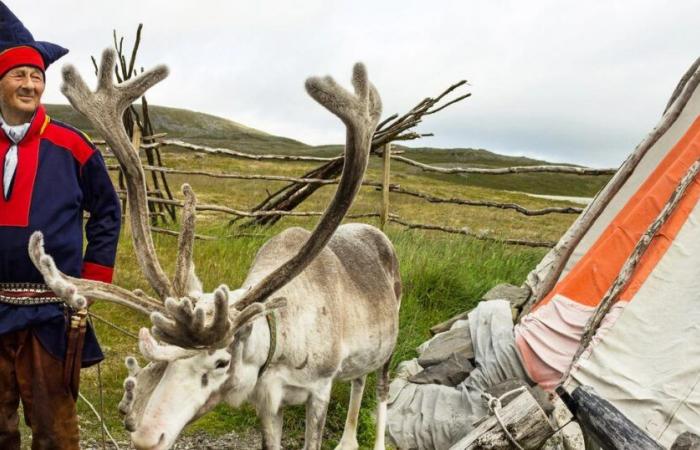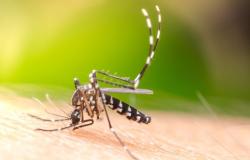In the Arctic region, the Sami, the last indigenous people in Europe, are keen to preserve their way of life. But climate change puts it in serious danger. Present in Lapland for millennia, they now see their reindeer, their traditions and even their language being threatened.
“Last winter, a lynx killed five of my reindeer. These animals are my whole life,” says Brita, a Sami reindeer herder, pointing to an injured reindeer. At this time of year, temperatures should be much lower in the region.
“With such heat, the snow melts. But when the cold returns, it creates a thick layer of ice on the ground, preventing the reindeer from digging to reach their food. We then have to feed them ourselves to ensure their survival, which which costs a lot of money,” laments Brita, interviewed Monday in Tout un monde.
“Reindeer are everything to us”
The abnormally fine snow in November crunches underfoot. Brita goes back inside her house to warm up. She dips a piece of dried reindeer meat into her still steaming coffee, before taking a sip. She then explains that the land used for herding their reindeer is constantly reduced by the expansion of the mining industry, the installation of wind farms and deforestation.
If the reindeer disappear, all our traditions disappear with them. They are everything to us
“Back then, our reindeer could find food in the old forests, but nowadays there are very few of these forests with lichen, there are only young forests where nothing grows. If reindeer disappear, all our traditions disappear with them. They are everything for us.
Reindeer herders Anders and Mikael live with the same concerns as Brita. The two men live even further north in Swedish Lapland, beyond the Arctic Circle. For them, as for the rest of the Sami, there are eight seasons and each has its importance. Except that here, more than elsewhere, they all mix together.
Rising temperatures
“Winters are no longer what they used to be. One day it’s +10 degrees and -30 the next day. Everything has become more extreme. Generations before me spoke and remembered bad winters. The current generation will remember good winters, because they won’t happen often,” confides Anders.
Two weeks ago, several hundred reindeer drowned due to thin ice. This has never happened before
During transhumance, which normally takes place in November or December, the Sami cross frozen lakes, streams or rivers with their reindeer. But today, on these lands where temperatures are rising four times faster than on the rest of the planet, they can no longer trust the ice.
“The autumns are getting hotter and wetter and the temperatures are very variable, so we no longer have that thick, stable layer of ice that used to be the norm. All those roads that cut through the lakes have always been reliable , we never had a problem Today, we have to be much more careful. Two weeks ago there was a tragedy in the north of Norway where several hundred reindeer drowned because of too much ice. fine It was never before. arrived”.
>> The Living History topic dedicated to the Sami:
Know-how under threat
All these changes and disruptions also have an impact on their language. Indeed, the Sami language is intrinsically linked to traditional activities such as fishing and reindeer herding, as well as the observation and description of nature and weather conditions.
In Sami, for example, there are words to describe a frightened reindeer or an early spring salmon. Terms that are almost no longer used because with the melting of the ice and the rise of the oceans, salmon populations are decreasing drastically.
We use very specific words in Sami which we use to describe our practices. Many words will surely end up disappearing
Certain ancestral know-how is also threatened with disappearance, like the traditional method of making dried meat. During autumn and winter, when reindeer are slaughtered, the meat is preserved in a wooden box filled with compacted snow, then stored in the mountains for the entire cold season. In the spring, it is collected, salted and smoked. However, abnormally mild temperatures disrupt this process: the meat defrosts too early and deteriorates, jeopardizing this centuries-old practice.
Towards a “real” end to winter?
A know-how that is closely linked to the Sami language, explains Mikael. “Reindeer herding is passed down from generation to generation. We use very specific words in Sami which we use to describe our practices. Many words will surely end up disappearing and we will have much less nuance.”
Asked about the winter schedule, they unanimously responded that there might well be no winter at all. Without winter, there would be no transhumance or production of dried meat, which would mean less food and fewer opportunities to converse in the Sami language. Despite this, these remarkably resilient people maintain the hope of seeing a real winter return.
Ottilia Férey/hkr






